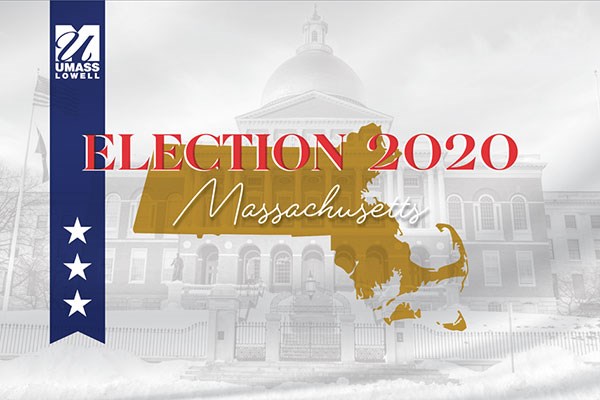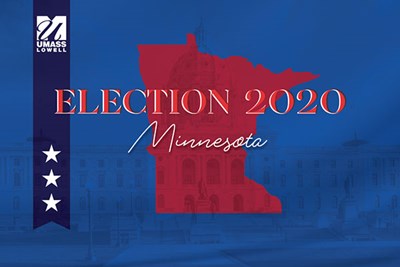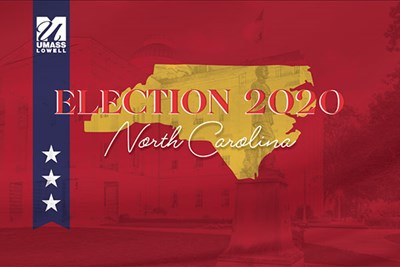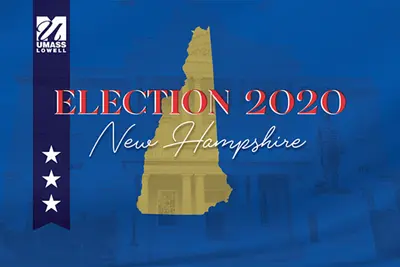Likely voters also weigh in on Kennedy-Markey Senate race and more, including Tom Brady and the T

02/21/2020
Contact: Christine Gillette, 978-934-2209 (o), 978-758-4664 (c), or Christine_Gillette@uml.edu or Nancy Cicco, 978-934-4944 or Nancy_Cicco@uml.edu
LOWELL, Mass. – U.S. Sen. Bernie Sanders and U.S. Sen. Elizabeth Warren are locked in a neck-and-neck race for delegates in the Massachusetts primary, according to a new poll released today by the UMass Lowell Center for Public Opinion.
Sanders has the support of 21 percent of likely voters in the Massachusetts Democratic primary compared to 20 percent who support Warren. Former South Bend, Ind. Mayor Pete Buttigieg is in third place at 15 percent, followed by former Vice President Joe Biden at 14 percent, former New York Mayor Michael Bloomberg polls at 12 percent, U.S. Sen. Amy Klobuchar is at 9 percent, U.S. Rep. Tulsi Gabbard is at 3 percent and businessman Tom Steyer is at 2 percent; 4 percent of likely voters are undecided.
Detailed poll results – including analysis, topline and methodology – are available at www.uml.edu/polls. The independent, nonpartisan poll was conducted by the University of Massachusetts Lowell’s Center for Public Opinion, which uses the latest technology and highest standards in its state and national polls. The center is a member of the American Association for Public Opinion Research’s Transparency Initiative and presents events and polls on political and social issues that provide unique opportunities for civic engagement, experiential learning and research.
The poll released today found that Sanders leads among likely Massachusetts primary voters younger than 45, with 31 percent. Warren is second with that age group at 22 percent, followed by Buttigieg with 18 percent. Warren is first with voters 45 and older, with 19 percent, followed by Sanders with 16 percent, Biden and Bloomberg tied with 14 percent and Buttigieg with 13 percent.
With Massachusetts’ Super Tuesday primary less than two weeks away, the poll found that 39 percent of likely voters feel they could still change their mind about which candidate they support. In polls this week of four other Super Tuesday states (Minnesota, North Carolina, South Carolina and Texas) by the Center for Public Opinion, Sanders had the most stable base of support, ranging from 80 to 90 percent of his supporters saying they will definitely vote for him. But in Massachusetts, the top four candidates have nearly the same stability among voters who support them, with Buttigieg at 71 percent, Biden and Sanders at 70 percent and Warren at 69 percent. Bloomberg’s support among Massachusetts likely voters appears to be the softest, with only 40 percent of his voters saying they will definitely vote for him and 60 percent saying they could change their mind. Details on candidates’ favorability ratings can be found in the poll results at www.uml.edu/polls.
“This is a big moment for Elizabeth Warren. While Bernie Sanders has emerged as the frontrunner in the race for the Democratic nomination, Warren registered her best debate performance to date in Nevada on Wednesday night and now looks to build on that momentum. In order for her to emerge from the pack, she has to be able to not only pick up delegates, but beat Sanders in her home state on Super Tuesday,” said Joshua Dyck, director of the Center for Public Opinion and associate professor of political science.
The poll also looked at likely voters’ views on the race for U.S. Senate between incumbent Ed Markey and U.S. Rep. Joe Kennedy III. Thirty-five percent say they support Kennedy and 34 percent support Markey, but 23 percent say they are undecided and 8 percent said they are likely to support another candidate.
Kennedy leads among likely voters who are men, older and moderates, while Markey leads among women, younger voters and liberals. Kennedy wins 40 percent of those 45 and older, compared to Markey at 33 percent, while Markey wins the support of 37 percent of those younger than 45, compared to Kennedy’s 25 percent. Kennedy leads among men at 40 percent to Markey’s 30 percent and Markey leads among women 37 percent to Kennedy’s 32 percent. Among liberals, Markey leads 44 percent to 31 percent, and Kennedy leads among ideological moderates 41 percent to 27 percent. More on voters’ views on this race is available at www.uml.edu/polls.
“While the Senate primary looks close at first glance, there are worrying signs for incumbent Ed Markey. Kennedy bests Markey on every dimension we asked about, including fighting for the environment, Markey’s signature issue. We weren’t expecting this level of separation between the two candidates so early. The ‘Seinfeld primary’ is starting to get a serious storyline and though it’s in development, Kennedy looks more and more like the star of the show,” said John Cluverius, associate director of the Center for Public Opinion and assistant professor of political science at UMass Lowell.
The poll also looked at how Democratic likely voters feel about other Massachusetts public figures. Seventy-two percent said they approve of how Massachusetts Gov. Charlie Baker is doing his job and his favorability rating is +29. For favorability ratings, Massachusetts Attorney General Maura Healey is at +37, U.S. Rep. Ayanna Pressley is at +34 and U.S. Rep. Seth Moulton is at +14.
Likely Massachusetts Democratic primary voters were also surveyed on a range of other topics and found:
- Asked about commute times in Massachusetts, 27 percent said their commute has gotten worse in the last year, 68 percent said it has stayed the same and 5 percent said it has gotten better;
- The MBTA has a net negative favorability rating of -18 (27 percent see it favorably, 45 percent unfavorably);
- Wynn Casinos, which operates the Encore hotel and casino in Everett, has a net negative favorability of -26 (15 percent favorable, 41 percent unfavorable);
- Columbia Gas, company involved in the 2018 Merrimack Valley gas explosions, has a net negative favorability rating of -40 (11 percent favorable, 51 percent unfavorable);
- Tom Brady, despite his uncertain future with the New England Patriots, remains popular with a net positive favorability rating of +42 (61 percent favorable, 19 percent unfavorable);
- But even Tom Brady can’t beat Dunkin in popularity – the company has a +52 net positive favorability rating (68 percent, 17 percent unfavorable).
The poll of 450 likely Massachusetts Democratic primary voters was independently funded by the University of Massachusetts Lowell. The survey was designed and analyzed by the Center for Public Opinion and fielded by YouGov from Feb. 12 through Feb. 19 and has an adjusted margin of error of plus or minus 6.1 percent. Full poll methodology is available at www.uml.edu/polls.
UMass Lowell is a national research university located on a high-energy campus in the heart of a global community. The university offers its more than 18,000 students bachelor’s, master’s and doctoral degrees in business, education, engineering, fine arts, health, humanities, sciences and social sciences. UMass Lowell delivers high-quality educational programs, vigorous hands-on learning and personal attention from leading faculty and staff, all of which prepare graduates to be leaders in their communities and around the globe. www.uml.edu




